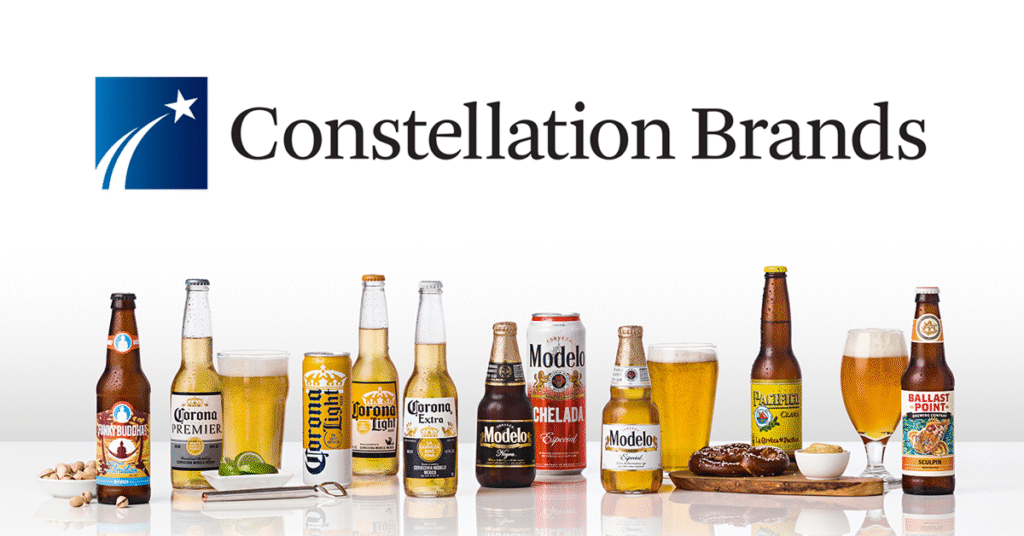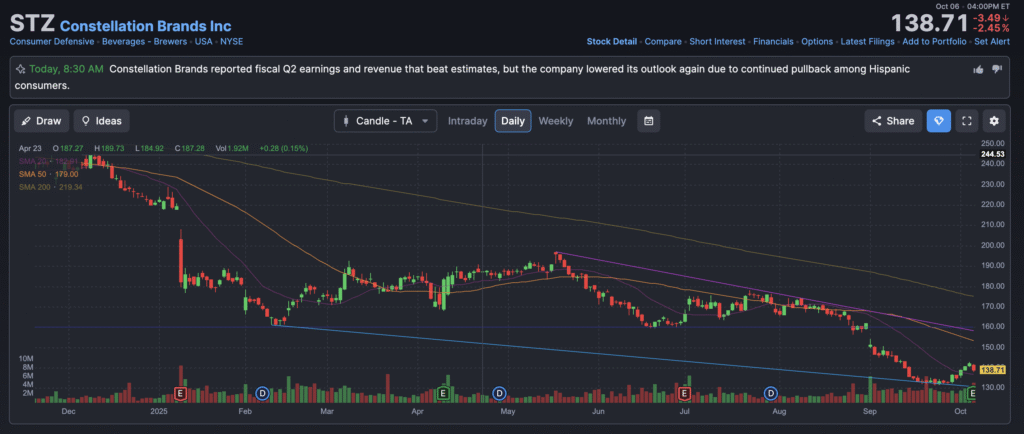Constellation Brands is a leading producer and marketer of beer, wine, and spirits, founded in 1945 and headquartered in Victor, New York. The company’s portfolio includes well-known beer brands such as Corona, Modelo, and Pacifico, as well as premium wine and spirits labels like Robert Mondavi, The Prisoner Wine Company, and High West Whiskey. In fiscal 2024, Constellation reported annual net sales of approximately $9.8 billion, growing around 7% year-over-year, driven primarily by strong demand for its imported beer brands. Its key competitors include Anheuser-Busch InBev, Molson Coors, and Diageo. Constellation remains one of the most profitable alcohol companies in North America, fueled by premiumization trends and its dominant position in the U.S. beer import segment.

Constellation Brands announced its fiscal second-quarter 2025 earnings on October 3, 2024. The company reported earnings per share (EPS) of $3.57, surpassing analyst estimates of $3.47, and revenue of $2.84 billion, slightly above expectations of $2.82 billion. Net sales grew 6.2% year-over-year, with beer sales rising 8% and wine and spirits declining by 2%. Operating income grew 9% thanks to pricing power and improved cost management, while margins expanded due to favorable product mix. Management reaffirmed its full-year fiscal 2025 EPS guidance of $13.50–$13.80 and projected net sales growth of 6–7%, reflecting continued beer strength and moderate softness in wine and spirits.
Constellation Brands was founded in 1945 by Marvin Sands as Canandaigua Industries, a small wine producer based in upstate New York. The company went public in 1973 and rebranded to Constellation Brands in 2000 to reflect its expanding portfolio of alcoholic beverages. Over the years, Constellation has made several strategic acquisitions, including Robert Mondavi Winery in 2004, the U.S. distribution rights to Corona and Modelo in 2013, and The Prisoner Wine Company in 2016. It also made a high-profile $4 billion investment in Canadian cannabis company Canopy Growth in 2018, though its returns have since been mixed. Headquartered in Victor, New York, the company has over 10,000 employees and operates primarily in the United States, Mexico, and Canada.
Constellation’s product portfolio is anchored by its beer segment, which contributes roughly 80% of total revenue and nearly 90% of operating income. Corona Extra and Modelo Especial are the top-selling imported beers in the U.S., with Modelo recently surpassing Bud Light as the country’s best-selling beer. The company’s wine and spirits division, which includes brands such as Kim Crawford, Meiomi, Ruffino, and High West, targets premium and ultra-premium consumers. Competitors include global giants like Anheuser-Busch InBev (Budweiser, Stella Artois), Molson Coors (Coors Light, Blue Moon), and Diageo (Guinness, Johnnie Walker), as well as premium wine and craft spirit producers like E. & J. Gallo and Brown-Forman.
The alcoholic beverage market that Constellation operates in is valued at over $1.8 trillion globally, with the U.S. market representing nearly 20% of that total. The beer segment, particularly premium and imported beers, is expected to grow at a compound annual growth rate (CAGR) of about 4.5% through 2030, supported by consumer shifts toward higher-quality products and moderate alcohol consumption. The global wine market is expected to grow at around 3% CAGR, while the spirits market, especially in tequila and whiskey, is projected to grow 6–7% annually through the decade. Constellation’s strength in Mexican imports positions it well to benefit from continued U.S. demographic and cultural trends favoring these beverages.
Competition in the beverage alcohol industry remains intense. Anheuser-Busch InBev holds the largest global beer market share but has been losing U.S. ground to Constellation’s Modelo brand. Molson Coors has been revitalizing its portfolio with new flavored drinks and craft offerings. Diageo dominates in global spirits and has expanded into ready-to-drink cocktails, a fast-growing subcategory. Despite these pressures, Constellation’s distribution partnerships and its focus on Hispanic consumers—a key demographic driving U.S. beer growth—have allowed it to maintain pricing power and steady volume growth.
Constellation’s unique differentiation lies in its dominance in the imported beer market and its ability to premiumize its portfolio across categories. Modelo Especial’s rise to the number one beer brand in America demonstrates Constellation’s marketing acumen and its deep understanding of consumer trends. The company’s vertically integrated beer supply chain in Mexico provides significant cost advantages and supply security, while its balanced portfolio of beer, wine, and spirits allows it to hedge against shifts in consumer preferences.
The management team is led by Bill Newlands, who has served as CEO since 2019 after joining the company in 2015 as Chief Operating Officer. He has overseen Constellation’s transformation toward a beer-centric growth strategy. Chief Financial Officer Garth Hankinson, appointed in 2020, has been instrumental in maintaining financial discipline and returning value to shareholders through dividends and share repurchases. The board is chaired by Rob Sands, son of the founder, who previously served as CEO from 2007 to 2019 and played a major role in securing the Corona and Modelo rights.
Over the past five years, Constellation Brands has delivered steady financial performance with revenue growing from $8.1 billion in fiscal 2019 to $9.8 billion in fiscal 2024, representing a 3.8% CAGR. Operating income rose from $2.2 billion to $2.9 billion over the same period, while EPS increased from $9.12 to $12.85, reflecting both organic growth and share buybacks. The beer business has been the key growth driver, posting high-single-digit volume increases annually, while wine and spirits have seen a strategic divestiture of lower-end brands to focus on premium segments.
Constellation’s balance sheet remains strong, with total assets of around $24 billion and debt of approximately $11 billion as of 2024, giving it a net debt-to-EBITDA ratio near 3.0x. The company consistently generates robust free cash flow, exceeding $2 billion annually, allowing for ongoing capital investments in Mexican brewery expansions and shareholder returns. Dividend payments have grown steadily, and share repurchases continue to reduce share count, supporting EPS growth.
Looking forward, the bull case for Constellation Brands centers on continued strength in its beer business, premiumization across categories, and operating margin expansion as its Mexican facilities reach scale. Conversely, the bear case focuses on potential macro headwinds including slowing consumer demand, rising input costs, and regulatory risks in Mexico affecting beer production.
Following its Q2 FY2025 results, analysts reacted positively, with Barclays and UBS raising their price targets to $320 and $315 respectively, citing strong beer trends and effective pricing strategy. JPMorgan reiterated its “Overweight” rating with a target of $310, while Morgan Stanley maintained “Equal Weight” at $285, noting limited upside from current valuations.

The stock is in a steep bearish stage 4 markdown on the monthly and weekly charts. The daily chart looks like it wants to reverse and has formed a good cup pattern and should head higher to the $150 zone, and then fall again at that point.